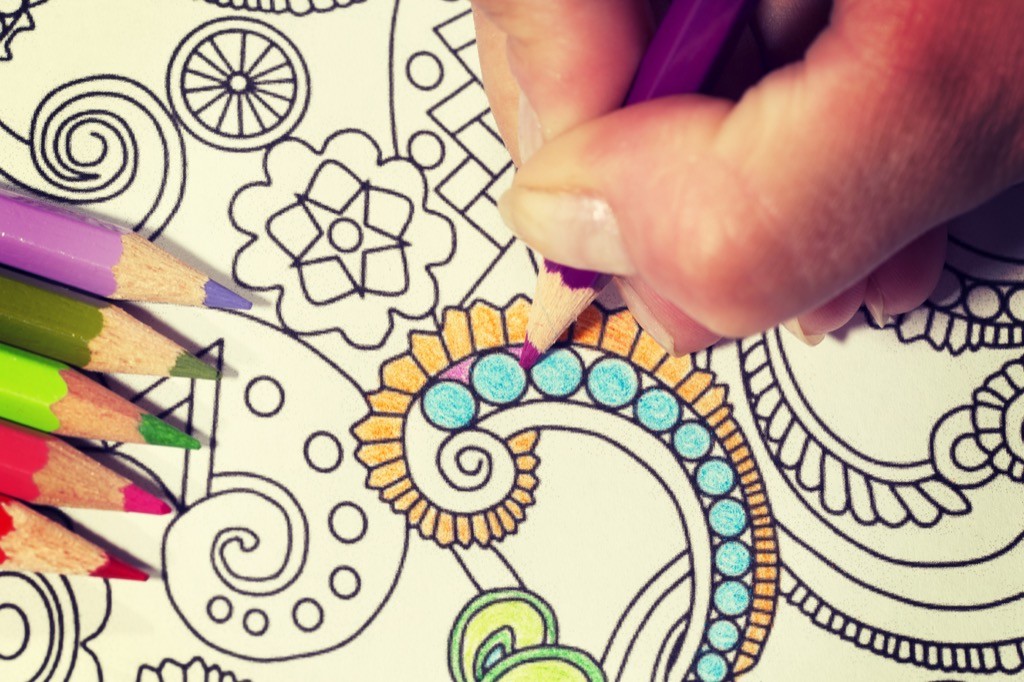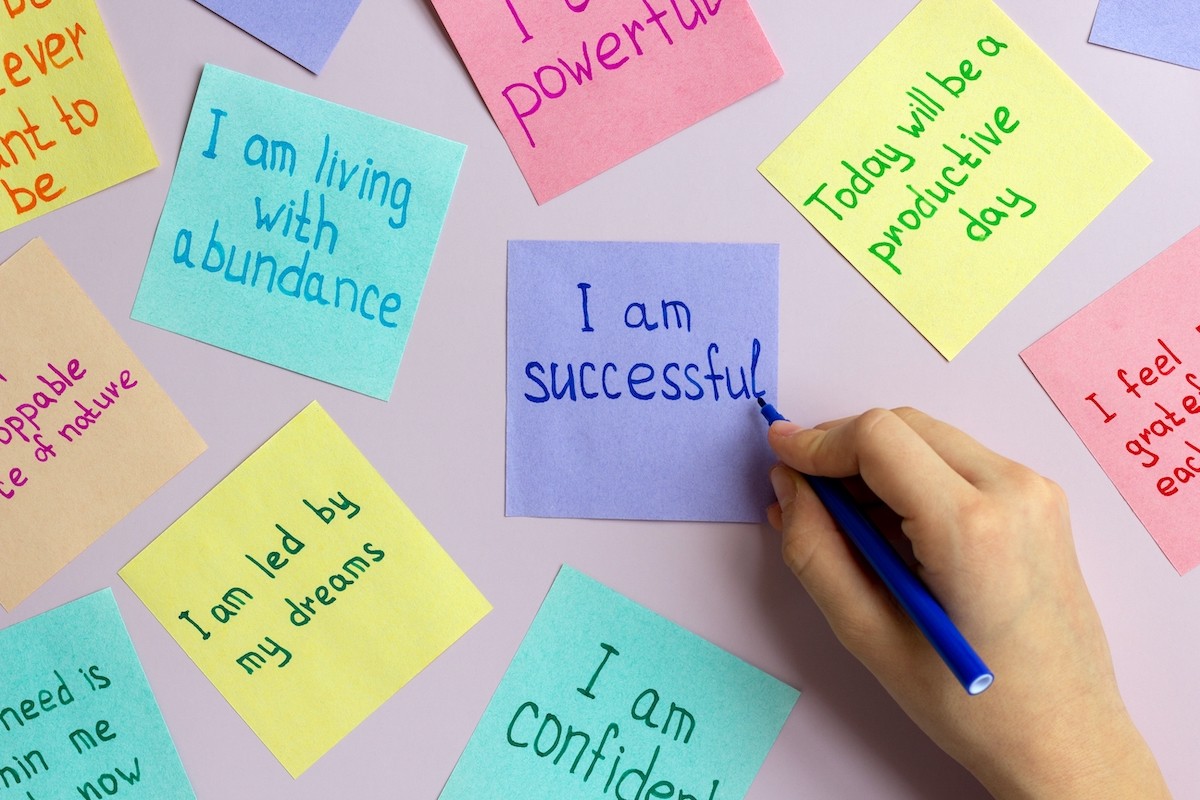30 Simple Tricks to Get Instantly Happy

Even those of us who have a generally positive attitude and sunny disposition can’t be happy all the time. Maybe you didn’t sleep well, are stressed about work, are having family issues, or just plain woke up on the wrong side of the bed. For any and all of these instances, it can be helpful to have an arsenal of tricks up your sleeve to turn your mood around. That’s why we consulted experts and scientific studies to put together this ultimate list of simple tips to get instantly happy.
RELATED: 9 Affirmations to Always Stay Positive.
1
Spend time with your pet.

Your dog may jump for joy when you walk in the door, or your cat might purr and rub against your leg when you get home. But being around your pet can have the same effects on your mood.
According to the American Psychiatric Association’s (APA) 2023 Healthy Minds Monthly Poll, respondents said their pets positively impact their mental health in the following ways:
- Help reduce stress and anxiety (69%)
- Provide unconditional love and support (69%)
- Offer companionship (69%)
- Provide a calming presence (66%)
- Are true friends (63%)
2
Eat clementines.

If you’re not a fan of citrus, it might be time to change that. A 2005 study published in the journal Chemical Senses found the smell of clementines made participants feel ridiculously happy and stimulated, so having one for a snack can give you a cheerful buzz. Plus, eating the fruit can also give you a major dose of vitamin C. It’s a win-win.
Alternatively, you can use citrus oil, as Kara Ladd, a writer, speaker, and strategist at KL Consulting at Kara Ladd, explains.
“I carry around citrus essential oils everywhere I go. Your nose (olfactory system) is directly connected to the brain (the amygdala), so scents can instantly impact your emotions and mood,” she shares. “I put a few drops in the palm of my hands, rub them together and cup my nose. I then apply to my temples and on my cupid’s bow, right below my nose. It’s like a burst of happiness and creativity every time I use it!”
3
Practice gratitude.

Whether you write it down or just think about it, giving gratitude each day is a simple way to feel happy.
“When you practice gratitude, the research shows your brain changes pathways. You get better at finding patterns that align with positive things and you simultaneously get worse at finding the negative,” explains Kelsey M. Latimer, PhD, CEDS-S, founder and owner of BSNKML Psychological Services.
In fact, researchers from the University of California, Davis (via Harvard Health Publishing) conducted an experiment in which study subjects were asked to keep a weekly journal for a period of 10 weeks. The subject pool was divided into three groups: one that was instructed to write about things they were grateful for, a second instructed to write about the things that bothered them, and a third instructed to write about any events that had affected them for better or worse. At the end of the study, those who had kept a gratitude journal reported more optimism and happiness than subjects in the other two groups.
If you’d like to start a gratitude journal, here’s what Latimer recommends: “Write ten completely distinct things you are grateful for each day. Be detailed on why you are grateful. For example, I am grateful to my body that it allowed me to go on a beautiful walk and take in the fresh air today.”
4
Relive a joyful moment.

“Research shows reliving joyful moments instantly boots your happiness,” notes Alison McKleroy, LMFT, a licensed mindfulness-based cognitive behavioral therapist, author, and founder of Center for Spark.
“Close your eyes and savor the details of the experience and take in the joy from your memory,” she suggests.
5
Color.

Not only does coloring make you feel like a kid again, but it’s also been shown to help relieve stress and boost happiness levels. Both a 2018 study and a 2020 study found that using coloring books, as well as freehand drawing, decreased anxiety levels in adults.
Much of this is attributed to the mindfulness that comes with such activities. And these days, there are so many fun options for adult coloring books.
6
Perform an act of kindness.

“Helping others gives a sense of purpose and joy. It creates a ‘helper’s high,’ releasing oxytocin, which lowers stress and increases feelings of happiness,” shares integrative life coach Aine Rock.
“Simple acts like paying for someone’s coffee or sending a thoughtful message can make a big difference,” she adds.
7
Volunteer

If you have time spare, volunteering is also a wonderful way to feel happy.
“Research has found that participation in voluntary services is significantly predictive of better mental and physical health, life satisfaction, self-esteem, happiness, lower depressive symptoms, psychological distress, and mortality and functional inability,” confirms a 2018 study published in the journal BMC Public Health.
According to the Mayo Clinic, there are several reasons that giving back can lead to increased levels of happiness. Their experts say that volunteering provides an opportunity to nurture relationships and gives people a sense of meaning and purpose—both of which can help reduce stress and improve mood.
8
Talk to strangers.

Recent research shows that it’s not just your core group of family and friends that enrich your life. According to a 2022 study conducted by Harvard Business School doctoral students, talking to strangers is also important if you’re looking to boost your mood.
The researchers coined a term, “relational diversity,” to describe the two relationship factors that lead to a happier mood: richness and evenness. The “richness” of one’s relationships refers to whether someone interacts with people of various levels of closeness (family members, friends, acquaintances, and strangers). “Evenness” refers to how evenly distributed their interactions are across these groups.
“The more relationship categories they talk to in a day and the more even their conversations are across those categories, the happier they are,” explained Hanne Collins, a PhD student who co-authored the study, while speaking with NPR.
9
Remember to smile.

Smiling when you’re not happy can quickly turn your mood around, says Douglas Smith, a life coach, meditation instructor and owner of The House of Flow.
“When you engage certain facial muscles, in particular the zygomatic major muscle which raises the corners of your mouth, signals are sent to your brain which release neurochemicals such as endorphins (natural ‘feel good’ chemicals) and serotonin (the neurotransmitter that contributes to feelings of joy or happiness and also regulates our mood),” he explains.
10
Practice yoga.

“With its emphasis on breathing practices and meditation—both of which help calm and center the mind—it’s hardly surprising that yoga also brings mental benefits, such as reduced anxiety and depression,” writes Harvard Health Publishing.
And while any type of yoga is likely to yield these positive results, hot yoga may be even better. As Best Life previously reported, a 2023 study published in the Journal of Clinical Psychology found that joining weekly hot yoga classes for just eight weeks could reduce depressive symptoms by up to 50 percent.
11
Meditate.

There are plenty of studies that show just how many benefits there are to meditating—whether it’s lowering your stress levels or helping you relax—but it can also make you really happy.
A 2008 study published in the Journal of Personality and Social Psychology found that meditating at least five times a week for only 15 to 20 minutes a session resulted in a lot of positive emotions, including happiness.
12
Go on a silent walk.

Yes, you’ll want to leave your headphones at home when you go on a silent walk. But it’s about so much more than that.
“Participants commit to a deeper engagement with their environment, consciously noting the feeling of the ground beneath their feet, the rhythm of their breathing, and the natural sounds around them,” Andrew White, CPT, a certified personal trainer and the owner of Garage Gym Pro, previously explained to Best Life.
The meditative nature of this type of walk, combined with the benefits of physical movement, “encourages introspection and self-reflection,” added White. “This can help individuals process emotions, gain clarity, and achieve a sense of inner balance.”
In fact, according to a 2014 study published in the journal Frontiers in Psychology, “Those who are more connected to nature tended to experience more positive affect, vitality, and life satisfaction compared to those less connected to nature.”
13
Listen for the birds.

While you’re outside on a walk or hike, listen in for birds.
“A couple of recent studies have shown that exposure to bird songs is one of the most powerful aspects of nature for improving our mental health,” says Steven E. Pratt, MD, senior medical director at Magellan Healthcare.
You can also incorporate these sounds indoors. “Instead of an alarm, you could set your wake-up signal to a bird song,” Pratt suggests. “You could also set bird songs to play on a speaker in your office during part of the day or on earbuds.”
14
Walk barefoot.

If you have easy access to a sandy beach or grassy area, take off your shoes and enjoy it, suggests certified life coach Andrena Liu., who refers to this technique as “grounding” or “Earthing.”
“The idea behind grounding is that our bodies are meant to come into contact with the Earth (a “grounded” state) regularly,” she explains of this philosophy. “The Earth has natural energy. When we walk barefoot, we connect with this energy, which can help balance our body and make us feel good.”
15
Put your hand on your heart.

Breathing with one hand on your heart is common in the yoga practice, and it’s for good reason. “Physical touch activates the parasympathetic nervous system, which helps us feel calm and safe, and releases oxytocin, a hormone that produces feelings of security and connection,” explains McKleroy.
“When you notice a distressing emotion, place your hands over your heart,” she recommends. “Feel the weight of your hands on your chest. You can gently rub, tap, or intertwine your fingers.”
16
Listen to upbeat music.

“Research shows that listening to upbeat music can immediately lift us out of a bad mood,” notes McKleroy. “Play one of your favorite upbeat songs, or better yet, make a 10-minute playlist and listen to it every day for two weeks for best results.
To her point, a 2013 study published in the Journal of Positive Psychology found that listening to positive music for 12 minutes “may be an effective way to improve happiness, particularly when it is combined with an intention to become happier.”
RELATED: 15 Songs That Will Instantly Boost Your Mood.
17
Take a nap.

A short nap in the afternoon can revitalize you if you’re feeling sleepy, but it can also make you super happy: A 2022 study published in the Journal of Sleep Research found that a 40-minute nap “may be a useful way to improve mood while experiencing an acute stressor.”
18
Take a bath.

For many of us, there’s nothing quite as soothing as slipping into a hot bath at the end of a stressful day. Now, research backs up the notion that regular baths can improve your physical and mental health.
In particular, a 2018 study published in the journal Evidence Based Complementary Alternative Medicine found that those who took immersion baths every day for two weeks were less likely to report fatigue, stress, pain, and poor mood than they were during a control period, during which they took showers.
“Scores were lower for stress, tension-anxiety, anger-hostility, and depression-dejection” when the subjects bathed, the researchers wrote.
19
Drink a cup of coffee.

Coffee isn’t just a great way to start your day with a little energy—it’s also a mild antidepressant. According to a 2011 study published in JAMA, the caffeine releases dopamine and serotonin that gives you that amazing high-on-life feeling, making you feel happier overall.
20
Stay off social media.

Sure, scrolling through social media can be fun—but it can also really mess with your head. “Social media can negatively impact our overall wellbeing by fueling anxiety, depression, loneliness and FOMO (fear or missing out),” writes UC Davis Health.
Plenty of studies have been conducted to back this up, so limit your time double-tapping people’s pictures and you’re bound to feel much happier.
21
Watch funny videos.

One way you can get yourself giggling is by watching some funny videos. That’s exactly what researchers had participants do in a 2014 study published in the journal Advances in Mind-Body Medicine—and it worked, making them less stressed and happier overall.
“Your body relaxes and your brain chemistry undergoes a rapid change, offering you what we might call ‘instant happiness,'” explains professional counselor Carl Nassar, PhD, LPC.
22
Spend time with friends.

Getting together with friends is a great way to boost your happiness levels.
A 2008 study published in the journal Social Indicators Research found that people who are more socially active—whether that’s going to dinner with friends or even to the gym, where they’re surrounded by people—are happier than those who stay home and watch TV in their spare time.
23
Do any type of exercise you like.

Whether it’s jogging, spinning, strength training, or simply walking, moving your body is one of the simplest things you can do to feel happier.
A 2020 study published in the International Journal of Environmental Research and Public Health examined how exercise impacts mental well-being in young, middle-aged, and older adults.
“After controlling for demographic characteristics, participants with high and moderate activity levels had significantly higher life satisfaction and happiness than those with a low activity level across the total population and the three age groups,” the researchers wrote.
24
Take a dance break.

As we know, when we exercise, our brain releases feel-good chemicals. But according to neuroscientist Friederike Fabritius, MS, dancing is particularly great for boosting you mood.
“Not only do you release all kinds of feel-good chemicals due to the movement itself, you also activate your emotional brain as a result of the music. So get up and move! Just 15 minutes can have a tangible impact on your overall mood,” he shares.
25
Get yourself flowers.

Not only will a fresh bouquet of flowers brighten up your home, but it’ll also give you an instant boost of happiness.
A 2005 study published in Evolutionary Psychology found that the effect of flowers can actually last for days, making you feel happy far beyond the moment you bring them into your space.
26
Get some sunshine.

Let the sunshine in—and you may feel instantly happier. The sun gives us natural vitamin D, which is scientifically proven to affect mood—and it can be even more integral if you have a deficiency.
“With a vitamin D deficiency, an individual is more likely to experience depression since vitamin D receptors help regulate mood,” Kelly Springer, MS, RD, founder of Kelly’s Choice, previously explained to Best Life.
27
Create a list of accomplishments.

Executive coach Irina Mihaela, founder of Entrepreneur Enlightenment, suggests making a list of all your accomplishments, big and small (“even the spelling bee you won in grade school”), and keeping it handy.
“When you feel defeated, because maybe you did not get the anticipated promotion or a potential client refused to move forward with your services, pull out the list and read it,” she advises. “You can dwell on one of two more points that match the things you are going through.”
“This method works because it reminds you of your greatness,” she adds. “When times are tough, we forget all the good things in our lives, so it is essential to reverse that to feel happy.”
28
Take a cold shower.

“Brief exposure to cold can activate the sympathetic nervous system, increase blood level of beta-endorphin, and increase metabolic rate. All of these can lead to feelings of euphoria,” states Liu.
She continues, “Cold makes our body react strongly: It releases energy-boosting hormones that wake us up and make us feel alive. Afterward, as we warm up, we often feel relaxed and refreshed.”
29
Recite positive affirmations.

Saying out loud or writing down positive affirmations takes just a few seconds but can make a big impact on your mood.
“Our minds believe what we tell them to believe,” Mallory Grimste, LCSW, a mental health therapist specializing in working with teenagers, previously explained to Best Life. “Affirmations are a great way to adjust our thoughts to a more positive or beneficial way of thinking. It’s important to keep in mind we can’t always control our automatic thinking responses, but we can practice repeating, or affirming, other more helpful ways of thinking.”
30
Take a break.

Sometimes, if you’re feeling down, you just need to take a break from things.
“It’s okay to take a break—we all need breaks!” notes musician, therapist, and life coach Daniel Rinaldi. “Often times, our bad moods come from being overstimulated and exhausted.”
“Give yourself permission to turn off your electronics, grab a book, and cuddle up in bed,” he continues. “Take a bath, take a nap, just let yourself lie in bed and daydream. Remember, bad moods don’t last forever!”